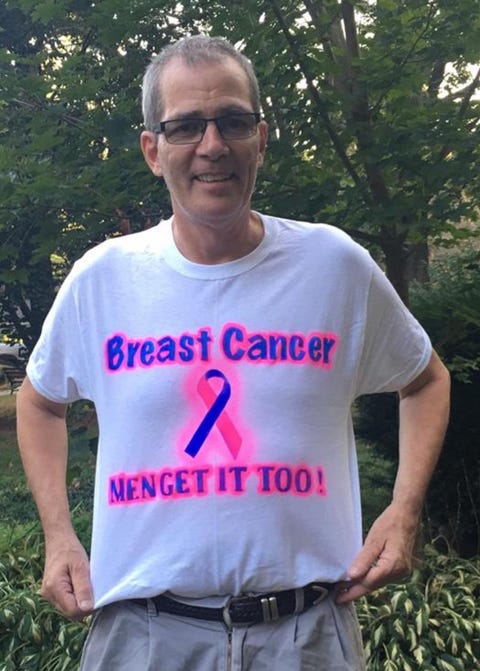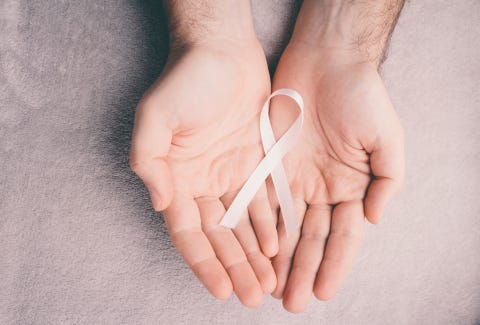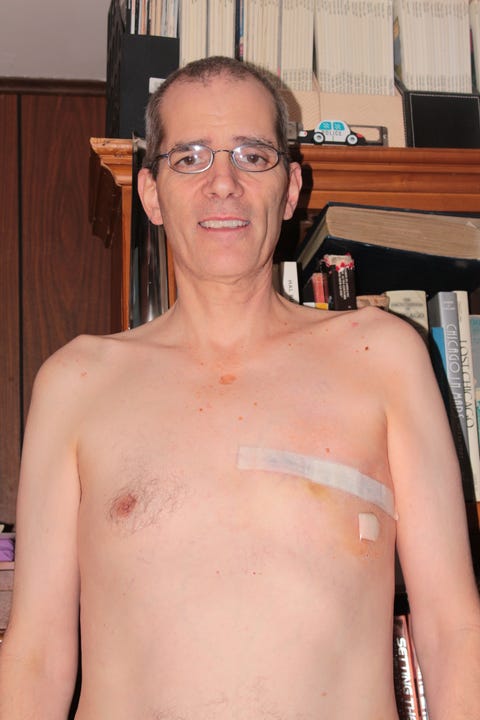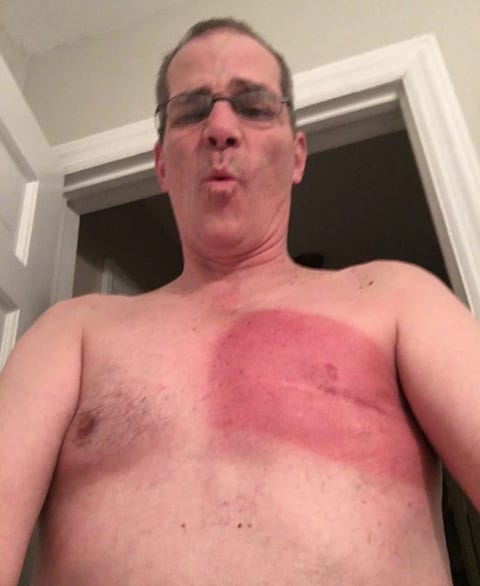
There was no way he would miss it: It was 2016, and the World Series parade would be roaring through downtown Chicago the very next day. But John Falk was laid up, recovering from surgery to remove his breast cancer—for the second time in his life. He told his doctor he was going to the parade.
“Nothing was going to stop me,” he tells MensHealth.com by phone, laughing as he recalls the incident. “My doctor didn’t want me to go, and was rightfully worried I’d overdo it. So I brought a pillow with me and did my best to lay low, but I got to watch the Cubbies triumph through the city.”
Falk’s story is incredibly unique, especially the fact he got breast cancer twice. It’s a reminder that breast cancer is not just a women’s cancer — it can happen to men, too.
Getty ImagesMarija Zamurovic / EyeEm
The lowdown on male breast cancer
“Breast cancer in men is extremely rare,” says Rena Zimmerman, MD, medical director of radiation oncology at Northwestern Medicine McHenry Hospital. “But it is the same, pathologically, as breast cancer in women.”
According to the American Cancer Society, 1 in 833 men are diagnosed with breast cancer, and 2,550 new cases were diagnosed in in 2018. African-American men are more likely to get it than other men, Zimmerman says.
Male breast cancer is typically diagnosed in older men between 60 and 70 years old — older than it is in women. Therefore, when it’s caught, the disease tends to have progressed to a later, more deadly stage.
The problem is men aren’t getting screened as much, and tend to ignore physical warning signs when it comes to their breasts. Male breast cancer symptoms include:
“Men are not taught that those things are abnormal,” Zimmerman says.
In men, 40 percent of breast cancer cases are hereditary. Guys with a family history of breast cancer should get genetic testing to determine if they carry the BRCA1 or BRCA2 gene, Zimmerman suggests. If they have it, they can begin proper preventative testing at a younger age. (The BRCA2 gene has also been linked to an increased prostate cancer risk.)
But with many cancer diagnoses, there may be no genetic link or specific cause. It just happens. That’s what happened to John Falk.
Falk was diagnosed with breast cancer in 2013, at age 55.
John Falk
“I noticed my left breast was swelled—it didn’t look right compared to the right side,” he says. “It was kind of itchy and tickly feeling. I went to my doctor, who referred me to a breast cancer surgeon, and he ordered some tests. I had a mammogram and a biopsy. All the tests came back negative.”
But a year later, he felt a lump in same breast. He went in for another mammogram and biopsy. This time, it was cancer.
“I had a full mastectomy of my left breast,” he says. “They caught it extremely early. It didn’t spread to any lymph nodes, and I needed no chemo, radiation or medication.”
“The thing I read about men’s experiences with breast cancer is the shame they felt.”
While the breast cancer diagnosis was shocking, he wasn’t embarrassed to talk about it.
“I worked at county jail as a corrections officer for 22.5 years. I called my sergeant and I said, ‘I have breast cancer and need surgery, and I’ll be out for two weeks,'” Falk recalls. “I told him, ‘I want you to tell people it’s breast cancer. I want them to know what I have.’
“The first day I got back, a bunch of my friends came up and said, ‘Ohhh, we heard you lose a moob, how you doing?’ You have to find humor in it,” he says.
John Falk
A year later, Falk found another lump. The breast cancer had come back.
“Since my left breast wasn’t there, it’s very smooth besides the scar. So they did another biopsy and removed the cancer. It hadn’t metastasized, but I had to undergo 30 radiation treatments,” he says.
Now, Falk feels like he has a responsibility to inform others about male breast cancer.
“The thing I read about men’s experiences with breast cancer is the shame they felt,” he says. “They don’t like going to doctors, hospitals. They convince themselves, ‘Oh it’s just a cyst. It’s nothing.’ I went into the office for my mammogram and it’s all women—the offices aren’t geared for men, but it didn’t bother me. I wasn’t embarrassed.”
In October especially—Breast Cancer Awareness Month—he’s been working to spread the word about male breast cancer in his local community.
“I’ve connected with the Male Breast Cancer Coalition and have been passing out ‘Men Have Breasts Too’ stickers all month,” he says. “I’ve shared my story on Facebook, and I hope to take away some of the shame and embarrassment men feel.”
Keeping humor in his story has helped Falk continue to heal.
“I joke and say I want to to start a survivor group—for just me and another guy,” he laughs. “But men should check their moobs and go to the doctor if something’s not right. It saved my life.”
Source: Read Full Article


